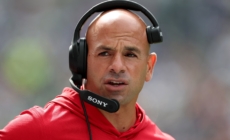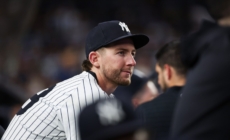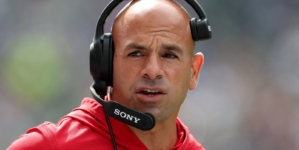-
After Four Shark Attacks in 48 Hours, Australia Shuts Dozens of Beaches - 42 mins ago
-
U.S. Tells Judge It Will Appeal ICE Restrictions in Minneapolis - about 1 hour ago
-
The Chinese Island Where Dreams of Real Estate Glory Never Die - 2 hours ago
-
Titans Reportedly Hiring Robert Saleh as Head Coach - 3 hours ago
-
Trump Issues M.L.K. Day Proclamation After Criticism - 3 hours ago
-
Clashes Erupt Around Syrian Prisons Holding Islamic State Fighters - 4 hours ago
-
Magnitude 4.9 Earthquake Shakes Southern California - 4 hours ago
-
Trump Links His Push for Greenland to Not Winning Nobel Peace Prize - 4 hours ago
-
Death Toll Rises in Guatemalan Gang Riots - 5 hours ago
-
Yankees Predicted to Trade Ryan McMahon to Angels For 98 mph Reliever - 6 hours ago
RFK Jr. Wants to Run U.S. Healthcare. He Doesn’t Even Understand It | Opinion
I’ve been a health researcher for many years. In this work, I always evaluate multiple factors that make positive and negative contributions to health. To understand a person’s health, we need to know the context of their lives: interpersonally, organizationally, politically and culturally.
Recently, for a project I am doing on healthy aging, I interviewed Martha, a woman in her seventies who lives in New York. With a rosary behind her, she started to tell me some of her story.
She escaped an abusive relationship from her husband. Drugs and addiction led her to jail. She met her wife. Got clean. Got sober. Had two kids. Prays the rosary. When I asked her about her health, she said, “I’m so terrified to go that I just don’t. I skip my preventive screenings. I skip my check-ins. I haven’t seen my neurologist in 7 years.” I started to ask more, and she interrupted, “I actually have to take half a lorazepam in order to leave the house.”
She’s afraid of how she’ll be treated, and the fear of that is greater than the fear of staying incredibly lonely and isolated in her apartment.
Mr. Robert F. Kennedy, Jr., is currently under questioning to become Secretary of U.S. Health and Human Services with primary responsibility for the health of our country. If confirmed, he will be responsible for overseeing Medicaid, the multibillion-dollar taxpayer-funded program that covers health care for roughly 80 million people. He’ll also be responsible for billions of dollars of health science research, an essential source of knowledge that has propelled the country forward.

Photo Illustration by Newsweek/Getty Images
Targeting funding for health programs to pay for the Administration’s distorted vision will harm the health of individuals, and it will create conditions that will make America sicker, actually. Cuts for women, the elderly, the children, people with disabilities—the people who most need access to good care—will lose it.
I listened to the hearings of Mr. Kennedy as part of my job. He flip-flopped on ideas, struggled to answer basic questions, and abandoned beliefs and morals about matters he used to take to be true and right, changing his mind about serious things—vaccines, abortions—while not having a clue about how the health care system even works, or how our existing agencies work.
When asked whether access to health care is a human right, he said, he couldn’t give an answer. He then gave an example of a 20-year-old who smokes, saying that if they needed health care, they would be taking from the pot.
Taking from the pot. Your health and access to care is up for negotiation? This should frighten and outrage people.
In the last two weeks, rights and access to lifesaving care for trans people have been eradicated with the stroke of a pen. Research frozen with the stroke of a pen. The health of our drinking water at immediate risk with the stroke of a pen. Access to information about reproductive rights, Medicare payments, erased with the stroke of a pen, or a click from Mr. Musk.
Mr. Kennedy, with all his opportunities to talk, chose to speak about chronic illness, telehealth, and cheeseburgers. Chronic illness is real. And yes, telehealth can address disparities, and under certain situations, can be highly effective.
But for people who are older and severely lonely, having an appointment to see their doctor might be their only social interaction that day. And if they’re lucky, that appointment might even mean their kid picks them up to take them to lunch, run an errand, spend time together. And that would generate a lot of good health.
What about loneliness—the new immigration policies that will wreak havoc on long-term care communities and home-care aides? What will happen if the assisted living community closes because of workforce shortages in your rural town? What about the stress of living in a chronically oppressed society that could reduce the life span of LGBTQ people?
Martha, who I mentioned previously, is gay and Latina. She’s petrified to go out, even to go to the doctor. It’s not just happening to Martha, but to millions.
It’s a very simple idea: no one is healthy until we all are healthy. I believe that the obsession with chronic illness is so unbelievably painful to listen to because the story is incomplete. Our health is affected biologically, genetically, and by processed foods, obviously.
But to not be able to talk and think about health without understanding the undercurrent of social factors impacting our health is wrong. And it is what precisely has made America sicker and will continue to make us sicker.
I believe that Mr. Kennedy’s strategy is filled with chaos and confusion, which may slow us down, and require us to reorganize and reconfigure. But we’ve never lived in a world designed for us. So, this is not new. We’re just getting our resistance started to keep America healthy.
These weeks have reminded me of what Virginia Woolf said in the essay “The Humane Art”: “A self that goes on changing is a self that goes on living.”
I just hope you all don’t make America too sick in the meantime. These are real and precious lives, Mr. Kennedy. We’re all watching.
Carey Candrian, Ph.D., is an associate professor in the Division of General Internal Medicine at the University of Colorado School of Medicine. She is a 2025 Health and Aging Policy Fellow. These views are her own and not those of her institution.
All views expressed are the author’s own.
Source link











